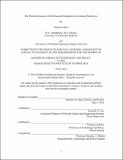The political economy of the research exemption in American patent law
Author(s)
Short, Nicholas, J.D. University of California, Berkeley
DownloadFull printable version (436.1Kb)
Other Contributors
Technology and Policy Program.
Advisor
Kenneth A. Oye and Nicholas Ashford.
Terms of use
Metadata
Show full item recordAbstract
One of the most important questions in innovation policy today is whether the acts of making and using a patented invention for research purposes should be exempt from infringement liability, also known as the research exemption. Most of the legal scholarship about the research exemption has focused on normative questions like whether the law should have an exemption and what form it should take. Few if any articles have approached the research exemption as a case study in the political economy of American patent law. This article analyzes the legal and political history of the research exemption from 1970 to the present in order to illustrate and expand upon existing theories about the political economy of American patent law. The history was constructed by first using law review commentary to identify all major instances when the research exemption became a prominent issue in a judicial, legislative, or executive forum, and then analyzing primary sources from those debates to identify the individuals and institutions that participated and the arguments they made. One major conclusion is that faulty economic ideology has played a significant role in shaping policy towards the research exemption, and that the Court of Appeals Federal Circuit--the standard bearer for that ideology--has exhibited a strong institutional bias against the research exemption. Together, these forces have created an excessively complex policy environment that is placing a significant strain on the national research system, a strain that executive agencies and the courts have tried to alleviate through ad hoc agreements and modifications of other patent doctrines, like the doctrine of subject matter eligibility.
Description
Thesis: S.M. in Technology and Policy, Massachusetts Institute of Technology, School of Engineering, Institute for Data, Systems, and Society, Technology and Policy Program, 2016. This electronic version was submitted by the student author. The certified thesis is available in the Institute Archives and Special Collections. Cataloged from student-submitted PDF version of thesis. Includes bibliographical references.
Date issued
2016Department
Massachusetts Institute of Technology. Engineering Systems Division; Massachusetts Institute of Technology. Institute for Data, Systems, and Society; Technology and Policy ProgramPublisher
Massachusetts Institute of Technology
Keywords
Institute for Data, Systems, and Society., Engineering Systems Division., Technology and Policy Program.